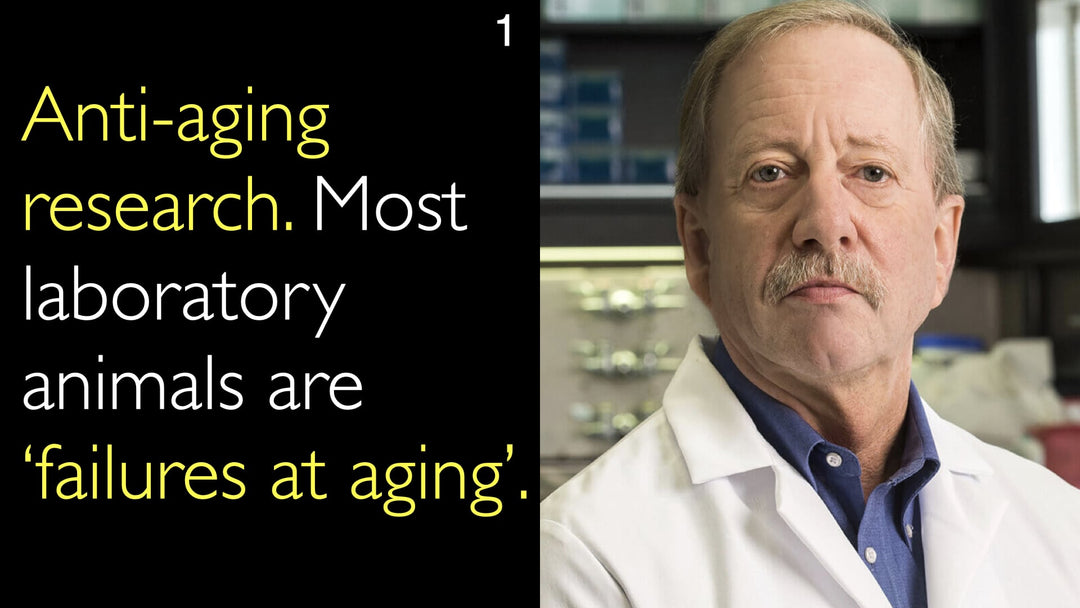노화 연구 분야의 선도적 전문가인 Steven Austad 박사(MD)는 장수 동물 연구가 인간 장수의 비밀을 풀 열쇠가 될 수 있다고 말합니다. 그는 생쥐나 벌레 같은 전통적 실험 모델이 노화 연구에 한계가 있다고 지적합니다. 이러한 종들은 너무 빨리 노화되기 때문입니다. Austad 박사는 인간보다 더 느리게 늙는 종들을 연구해야 한다고 주장합니다. 이 접근법은 건강한 수명을 늘리는 새로운 생물학적 메커니즘을 발견하는 데 도움이 될 수 있습니다.
장수 동물 연구를 통한 인간 노화 방지의 돌파구
목차 바로가기
노화 연구에서의 동물 모델
Steven Austad 박사는 노화 연구에 적합한 동물 모델 선정의 중요성을 논의합니다. 그는 거의 모든 동물 종이 노화를 경험하므로 사실상 모든 동물이 연구 모델이 될 수 있다고 지적합니다. Austad 박사는 모델 생물의 선택이 인간 노화 과정을 이해하는 데 중대한 영향을 미친다고 강조합니다.
Anton Titov 박사와의 인터뷰에서 다양한 종이 제공할 수 있는 독특한 통찰력을 탐구합니다. Steven Austad 박사는 연구자들이 인간 건강과 장수에 대한 연구 결과의 관련성을 극대화하려면 어떤 동물을 연구할지 전략적으로 선택해야 한다고 설명합니다.
특수 포유류에서 본 인간 장수
인간은 노화 양상 측면에서 포유류 중 예외적인 사례입니다. Steven Austad 박사는 인간이 대부분의 다른 동물 종보다 느리게 노화한다고 지적합니다. 그는 특히 인간이 바다에 살지 않는 포유류 중 가장 장수하는 종이라고 언급하며, 동물계에서 우리의 독특한 위치를 강조합니다.
이러한 예외적인 장수는 인간이 장기간 건강을 유지할 수 있게 하는 생물학적 메커니즘이 무엇인지에 대한 중요한 질문을 제기합니다. Austad 박사는 이러한 메커니즘을 이해하는 것이 노화 방지 연구와 건강한 인간 수명 연장을 위한 중재 개발에 소중한 통찰력을 제공할 수 있다고 봅니다.
느린 노화 종으로부터의 학습
Steven Austad 박사는 노화 연구에 혁신적인 접근법을 제안합니다. 그는 단명 종을 연구하는 대신 인간보다 느리게 노화하는 동물에 집중할 것을 주장합니다. 이러한 종들이 인간 수명을 이해하고 잠재적으로 연장하는 데 가장 가치 있는 교훈을 제공한다고 믿습니다.
Steven Austad 박사는 Anton Titov 박사에게 자연이 다양한 종에 걸쳐 예외적인 장수의 수많은 사례를 보여준다고 설명합니다. 성공적인 노화의 이러한 자연 모델을 연구함으로써 연구자들은 인간 노화 방지 치료법으로 전환될 수 있는 새로운 생물학적 경로와 메커니즘을 발견할 수 있을 것입니다.
자연계의 수명 변이
Steven Austad 박사에 따르면, 다양한 생물체 간 수명 변이는 정말로 방대합니다. 이 다양성은 노화 연구자들에게 도전이자 기회를 동시에 제공합니다. 처음에 Austad 박사는 이 변이를 종 간 생물학적 차이에 대한 추상적인 과학적 질문으로 접근했습니다.
그러나 Steven Austad 박사가 Anton Titov 박사에게 설명하듯, 그는 이제 수명 변이 이해의 심오한 실용적 의미를 인식하고 있습니다. 세계 인구 고령화가 점점 더 중요해짐에 따라, 장수 메커니즘에 대한 연구는 인간 건강과 의학에 그 어느 때보다 관련성이 높아졌습니다.
생의학 연구의 한계
Steven Austad 박사는 생의학 노화 연구의 현재 접근법에 대해 우려를 표명합니다. 그는 일반적으로 사용되는 실험동물을 인간보다 훨씬 빠르게 쇠퇴하기 때문에 "노화에서 명백한 실패자"로 특징짓습니다. 벌레, 쥐, 파리와 같은 종들이 인간 노화 양상과 근본적으로 다름에도 불구하고 노화 연구를 지배하고 있습니다.
이 우려는 Austad 박사가 Anton Titov 박사와 나눈 논의의 중심 주제입니다. 그는 그렇게 극적으로 다른 수명과 노화 궤적을 가진 생물체를 연구함으로써 연구자들이 인간 노화에 대해 진정으로 필요한 것을 배울 수 있을지 의문을 제기합니다.
노화 연구의 미래 방향
Steven Austad 박사는 전통적인 모델 생물을 넘어서는 노화 연구의 새로운 방향을 제시합니다. 그의 작업, 포함 곧 출간될 책 "메투셀라의 동물원"은 예외적으로 장수하는 종들을 조사함으로써 자연이 더 오래 사는 것에 대해 우리에게 가르쳐 줄 수 있는 것을 탐구합니다.
이 접근법은 연구자들이 노화 방지 중재를 어떻게 접근할지에 대한 패러다임 전환을 의미합니다. 단명 모델에서의 손상 복구에만 집중하는 대신, Austad 박사는 자연적으로 급속한 쇠퇴를 피하는 종들을 연구할 것을 제안합니다. 이 연구 전략은 인간 건강수명과 수명을 연장하는 근본적으로 새로운 접근법을 밝혀낼 수 있습니다.
전체 대본
Anton Titov 박사: 귀하는 두 권의 흥미로운 책을 출간하셨습니다: "왜 우리는 늙는가: 인생을 거쳐가는 몸에 대해 과학이 발견하는 것". 그 책은 여러 언어—적어도 여덟 개 언어—로 번역되었습니다. 귀하의 새 책 "메투셀라의 동물원: 더 오래 사는 것에 대해 자연이 우리에게 가르쳐 줄 수 있는 것"은 올해 MIT 프레스에서 출간될 예정입니다.
그럼 노화 과정에 대한 모델 생물로서의 동물 논의부터 시작해 보겠습니다. 동물들의 엄청난 수명 차이를 어떻게 이해해야 할까요?
Steven Austad 박사: 네, 그래서 저는 이것이 매우 중요한 점이라고 생각합니다. 제가 노화 연구 분야에 들어온 이후로, 저는 어떤 동물을 노화 연구에 사용할지 매우 신경 써왔습니다. 생각해 보면, 사실상 모든 동물이 노화를 겪으므로, 거의 모든 동물이 노화의 모델이 될 수 있어야 합니다.
그러나 인간은 대부분의 동물과 다릅니다. 우리는 대부분의 동물보다 느리게 노화합니다. 우리는 바다에 살지 않는 가장 장수하는 포유류입니다. 질문은: 우리가 인간의 삶에 대해 뭔가 가르쳐 줄 수 있는 다른 종으로부터 무엇을 배울 수 있나? 입니다.
제 생각은 우리보다 느리게 노화하는 종들을 보고자 하는 것입니다. 그곳이 자연으로부터의 교훈을 배울 곳입니다.
맞습니다. 가장 짧게 사는 생물체와 가장 오래 사는 생물체 사이에는 엄청나고 엄청난 차이가 있습니다. 처음에 제가 노화 연구에 뛰어들었을 때, 저는 그 차이를 이해하려고 했습니다.
제가 이 분야에 오래 있을수록, 저는: 잠깐만, 이것은 단순히 추상적인 질문이 아니라고 결심했습니다. 이것은 인간이 매우, 매우 관심을 갖는 것입니다, 특히 세계 인구가 고령화됨에 따라.
저는 또한 거의 모든 생의학 연구가 노화에서 명백한 실패자인 동물들과 함께 진행된다는 점에 조금 우려를 가지고 있습니다. 즉, 그들은 우리에 비해 매우, 매우 빠르게 무너집니다. 저는 벌레, 쥐, 파리를 연구함으로써 우리가 필요한 것을 배우지 못할까 걱정입니다.




